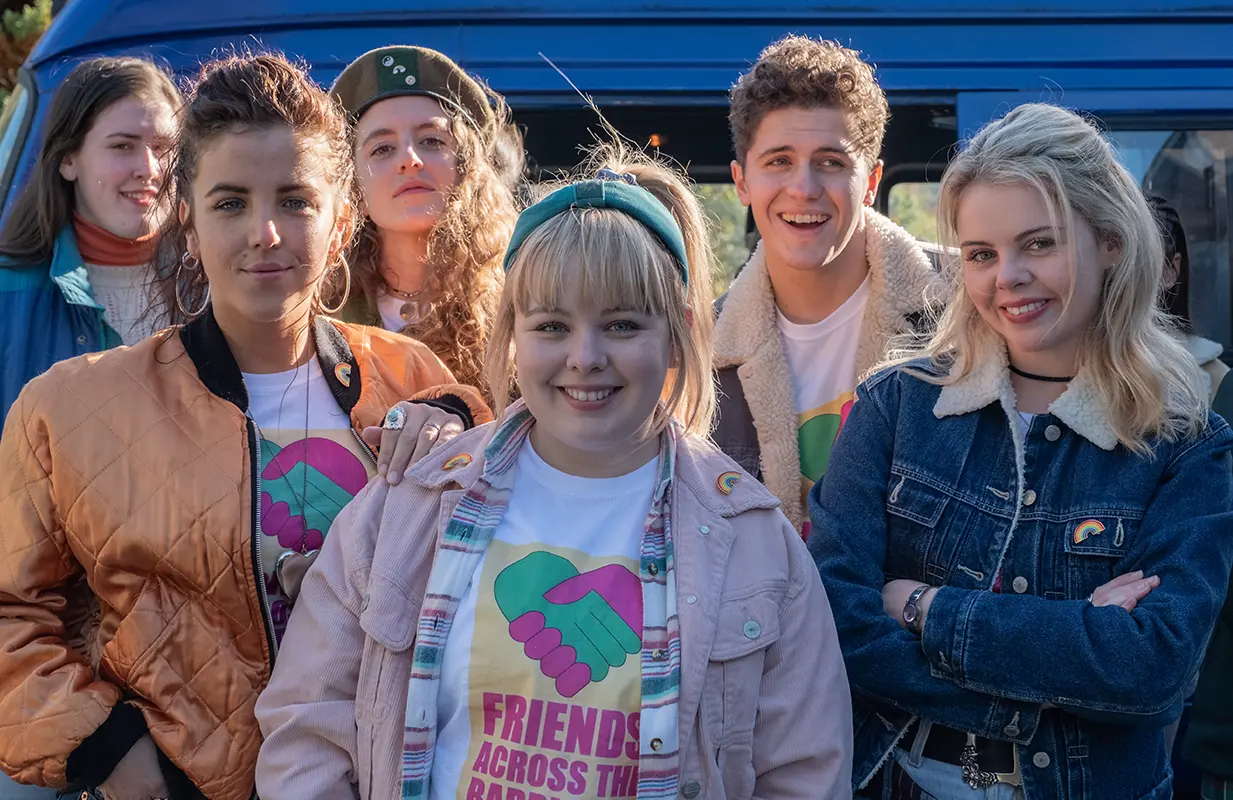Farewell to Derry Girls, the Last Girl-Centric Comedy of Its Kind
-
 Jamie-Lee O'Donnell, Louisa Harland, Nicola Coughlan, Dylan Llewellyn, and Saorise-Monica Jackson in Derry Girls. (Photo: Netflix)
Jamie-Lee O'Donnell, Louisa Harland, Nicola Coughlan, Dylan Llewellyn, and Saorise-Monica Jackson in Derry Girls. (Photo: Netflix)As Derry Girls ends its three-season run, it feels as if the world is losing a wee bit more than just a heartfelt and hilarious sitcom. The Lisa McGee-created series has always represented something larger than itself: Though it presents as a coming-of-age comedy about five teenagers in mid-1990s Derry, the series is set against the backdrop of the Troubles, a decades-long conflict that has defined the characters’ entire existence. Even when the Troubles seem to give way to normal teenage shenanigans, they’re never forgotten — just ask James (Dylan Llewellyn), who is constantly chided for his British upbringing.
But for many viewers, Derry Girls isn’t just a lesson in Irish history and Catholic resistance. It’s also one of the last remaining girl-centric comedies, which have rarely been afforded time to develop. Claire Danes’ My So-Called Life was famously pulled after one season in the mid-1990s; now, spending cutbacks have given way to the hasty cancellations of shows like Teenage Bounty Hunters (dropped by Netflix after one season in 2020) The Baby-Sitters Club (which lasted only two seasons at Netflix), and Paper Girls (axed just six weeks after its Prime Video premiere). Derry Girls had three seasons to come into its own, but this trend suggests future series won’t be given the same opportunity.
So what will television be losing as Derry Girls says goodbye? Like its swiftly-canceled genre counterparts, the series is a story of female friendship, above all else. The self-conscious Erin (Saoirse-Monica Jackson), eccentric Orla (Louisa Harland), studious Clare (Nicola Coughlan), wild child Michelle (Jamie-Lee O’Donnell), and the oft-ignored James couldn’t be more different, but their bond remains steadfast through every obstacle. After Clare comes out as a lesbian in the Season 1 finale, the girls rally around her, proudly wearing LGBTQ+ pride pins around the halls of their Catholic school, Our Lady Immaculate College.
At the end of the next season, the group is faced with a devastating prospect: James’ potential return to London. James may be the group’s punching bag, but the possibility of losing one of their own is too great to bear, particularly for his cousin Michelle. “It doesn’t matter that you’ve got that stupid accent, or that your bits are different than my bits,” she tells him. “Because being a Derry Girl, well, it’s a f*cking state of mind. And you’re one of us.” The episode ends with James loudly proclaiming that he is a Derry Girl, because this is a friendship that transcends gender or sexuality or ethno-nationalist conflict.
Derry Girls’ emotional beats are always satisfying, but it’s the show’s dry wit and endless stream of one-liners that draws viewers in. McGee, who wrote all 19 episodes, grounds the show’s comedy in the specific moment, relying on the Troubles and the tension simmering throughout Northern Ireland to fuel punchlines big and small. The standout Season 2 episode “Across the Barricade” sees the girls attend a weekend-long peace initiative with a group of Protestants, but rather than focus on bridge-building, Erin and Michelle hope to hook up with boys they believe to be free of Catholic guilt and sexual hang-ups. Their valiant, extremely awkward attempt at romance delivers as one of the episode’s main storylines, but the road to resolution is loaded with uproariously funny jokes, including a list of Catholic and Protestant “differences” — which features everything from “ABBA” to “distance between the eyes” — that remains one of the funniest things Derry Girls (or any show, for that matter) has ever produced.
That specificity is also apparent in the show’s commitment to recapturing the energy of the mid-1990s. Songs from Salt-N-Pepa, the Cranberries, and hip hop group Cypress Hill pop up throughout the series, while the adults of the show — what would a teen comedy be without a group of frustrated parents? — find themselves rooted in front of the television watching real political speeches and news broadcasts. Up-tempo music and depictions of devastating violence may seem like they serve cross-purposes, but these ’90s touches are essential to Derry Girls’ message: in a time of constant turmoil, music, clothes, and a group of ride-or-die best friends become a lifeline.
Through it all, Derry Girls has always allowed its characters to be aggressively and unapologetically themselves, and that’s why this loss stings so much. With programming catered to girls and young women first on the chopping block, there’s little left to fill the Derry Girls-sized hole in viewers’ hearts. Girls deserve to see themselves and their experiences represented on screen, whether that representation comes coupled with jokes about a centuries-old conflict or a profitable babysitting venture.
With that, farewell, Derry Girls. At the rate we’re going, there may never be another show like it.
Derry Girls' third and final season drops Friday, October 7 on Netflix.
People are talking about Derry Girls in our forums. Join the conversation.
Claire Spellberg Lustig is the Senior Editor at Primetimer and a scholar of The View. Follow her on Twitter at @c_spellberg.
TOPICS: Derry Girls, The Baby-Sitters Club, Paper Girls, Teenage Bounty Hunters, Dylan Llewellyn, Jamie-Lee O'Donnell, Lisa McGee, Louisa Harland, Nicola Coughlan, Saoirse-Monica Jackson